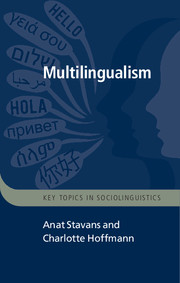Book contents
- Frontmatter
- Dedication
- Contents
- List of Figures and maps
- List of Tables
- Acknowledgements
- Introduction
- Part I Global and societal issues in multilingualism and trilingualism
- 1 Historical perspectives of language contact
- 2 Patterns of societal multilingualism
- 3 Old and new linguistic minorities
- 4 Globalisation, language spread and new multilingualisms
- Part II Construing individual multilingualism
- Glossary
- References
- Author index
- Places and languages index
- Subject index
1 - Historical perspectives of language contact
Published online by Cambridge University Press: 05 February 2015
- Frontmatter
- Dedication
- Contents
- List of Figures and maps
- List of Tables
- Acknowledgements
- Introduction
- Part I Global and societal issues in multilingualism and trilingualism
- 1 Historical perspectives of language contact
- 2 Patterns of societal multilingualism
- 3 Old and new linguistic minorities
- 4 Globalisation, language spread and new multilingualisms
- Part II Construing individual multilingualism
- Glossary
- References
- Author index
- Places and languages index
- Subject index
Summary
By such innovations are languages enriched, when the words are adopted by the multitude, and naturalised by custom.
Miguel de CervantesIntroduction
Multilingualism arises from contact between speakers of different languages. From earliest times people have moved around and had opportunities to come across groups with different linguistic features, whether in the pursuit of food or territory or trade, as regions that were fertile and accessible attracted peoples from different geographical and ethnic backgrounds and provided ample opportunities for cross-language communication. Whereas these may have been primary reasons for migration in the past, today we perceive such migration as ideologically motivated also by sociopolitical and ethnic identity. As such, ethnic groups have been defined according to real or perceived bonds such as race, religion or language (Edwards 1977, 1985) and, with regard to the latter, generally tend to be seen as being monolingual, although some have become users of two or more languages in the course of their history.
Their multilingualism eventually became a marker of their identity. From a present-day sociopolitical perspective, political units such as states very rarely are monolingual in the sense that all their citizens are speakers of one language only. The reason for this is simply that, in the case of old countries, the state boundaries have come about as a result of centuries of geopolitical changes and their emergence as independent polities. Younger states were seldom, if ever, drawn up according to ethnic considerations and therefore often cut across cultural and linguistic frontiers or encompass different linguistic groups. In this chapter we wish to address two major questions: What were the historical factors that brought about societal multilingualism? And why has this multilingualism prevailed in some societies while in others it has not?
- Type
- Chapter
- Information
- Multilingualism , pp. 11 - 36Publisher: Cambridge University PressPrint publication year: 2015



